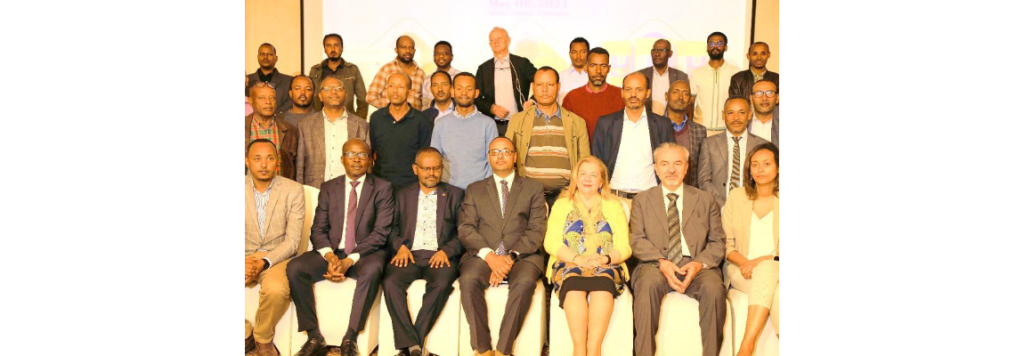Workshop Unveils the Nutritional, Food and Medicinal Value of Moringa

Addis Ababa – May 9, 2024 (EPHI) – A one-day workshop was held here yesterday at the Elilly International Hotel, focusing on exploring the potential of the Moringa value chain in contributing to food security and economic development. The workshop was further aimed at educating participants, promoting sustainable practices, showcasing products, creating entrepreneurial opportunities, facilitating networking, and addressing challenges.
The workshop, jointly organized by the Ethiopian Public Health Institute (EPHI) and the United Nations Industrial Development Organization (UNIDO), has attracted a diverse range of attendees, including health and nutrition professionals, community leaders, extension workers, students, educators, and international development partners and donors.
The master of ceremony, Dr. Masresha Tessema, Director of the Food Science and Nutrition Research Directorate of EPHI, extended a warm welcome to the enthusiastic gathering of 100 participants, who eagerly convened both physically and virtually to delve into the fascinating world of Moringa and explore its incredible nutritional, medicinal, and food value. After making brief remarks about the objective of the workshop, he invited officials of EPHI, UNIDO) and the Italian Agency for Development Cooperation (AICS) to deliver speeches in that order.
In a welcoming speech, Dr. Getachew Tollera, Deputy Director General of the Ethiopian Public Health Institute (EPHI), highlighted the institute’s commitment to addressing health and nutrition issues in Ethiopia, emphasizing the significance of combating malnutrition and enhancing maternal health for sustainable development goals. He further stressed the transformative potential of the Moringa value chain, not only in improving nutrition and generating income but also in fostering community development, and called for collaborative efforts to support smallholder farmers and promote sustainable agribusiness practices to harness this potential.
In an opening remarks, Mr. Pier Paolo Bergamini, Team Leader-Economic Development and Job Creation at AICS, emphasized that Moringa, along with other local agricultural commodities, is a valuable resource for Ethiopia, addressing malnutrition, boosting agricultural productivity, and creating economic opportunities, especially in food-insecure regions. Leveraging Moringa’s nutritional value, adaptability, and versatility is crucial for maximizing its benefits, he added.
In her official opening address, Ms. Aurelia Patrizia Calabro, UNIDO Ethiopia representative-Director of the Regional Hub Special Representative to the African Union, emphasized the urgent need for innovative solutions to enhance agriculture and nutrition in Ethiopia, leveraging the remarkable Moringa plant’s diverse benefits. Moringa, known as the ‘miracle tree,’ thrives in Ethiopia and offers opportunities for food security, agro-processing, and economic development. Recognizing the interconnected challenges, we aim to harness Ethiopia’s agricultural potential for growth and prosperity, she pointed out.
Following the opening speeches, Dr. Lemlem Sissay, Technical Advisor at UNIDO, briefed participants about the Moringa Value Chain project in the Southern Nations, Nationalities, and Peoples’ Region of Ethiopia. The project aims to improve food and nutrition security, enhance rural livelihoods, and empower women. According to her, the project focuses on sustainable production, value addition, nutrition-sensitive approaches, knowledge dissemination, and the establishment of market linkages. The project has achieved significant milestones, including engaging rural women, enhancing community capacity, providing training in various areas, establishing a demonstration unit, supporting product development, formulating marketing strategies, and setting up processing units with necessary equipment.
After the formal opening ceremony, a series of papers were presented, exploring various topics related to Moringa and its significant impact on nutrition security. These included studies on the nutritional profiles of Moringa, highlighting its potential as a solution for addressing nutrition security challenges. Additionally, research focused on the nutritional quality of complementary food formulated from locally available grains and Moringa stenopetala, shedding light on its efficacy as a valuable dietary resource. Another paper delved into the characteristics and economic importance of Moringa oil, showcasing its diverse applications and economic benefits. Furthermore, researchers discussed the emerging trends and prospects of Moringa stenopetala as a food fortificant, emphasizing Moringa’s recent advancements and potential. Finally, there were explorations of the potential therapeutic uses of Moringa stenopetala, underscoring its promising prospects in the field of medicine.
The workshop proved to be highly successful as it fostered an engaging environment for knowledge exchange and discussion. Following the presentations, attendees actively participated by asking thought-provoking questions, which were met with informative and insightful responses. These interactions effectively showcased the remarkable food and medicinal value of Moringa, highlighting its significant contribution towards addressing the pressing issue of food security within the country. The workshop’s success can be attributed to the enthusiastic participation of the attendees and the compelling evidence presented, which collectively emphasized the importance of Moringa as a sustainable solution for improving nutrition and overall well-being.
As the workshop drew to a close, Dr. Asefa Deressa, Senior Research Advisor for EPHI, expressed his heartfelt appreciation to the participants for their active engagement in the discussions. He emphasized the crucial importance of centralizing research efforts related to Moringa within EPHI, underscoring the need for strategic coordination of various initiatives in this field. Dr. Asefa further emphasized the necessity of conducting meticulously designed research experiments and clinical trials to thoroughly explore the potential benefits of Moringa. In particular, he proposed integrating these trials with the existing school feeding program, presenting a valuable opportunity to assess the practical impact of Moringa on the nutrition and health of children. (EPHI)
